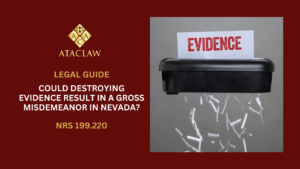Just as truthfulness is crucial in legal proceedings, the integrity of evidence used in these proceedings is equally important. Under Nevada Revised Statute 199.220, destroying, altering, or concealing evidence with the intention of obstructing the law is deemed a gross misdemeanor. As legal experts at ATAC LAW, we want to provide clear insights into this statute, ensuring you understand the consequences of tampering with evidence in Nevada. In this blog post, we dissect the ramifications of such actions and offer advice for anyone facing such charges.

What Does ‘Destroying Evidence’ Mean Under Nevada Law (NRS 199.220)?
Under the provisions of Nevada Revised Statute § 199.220, it is deemed a legal offense to deliberately destroy, modify, or hide evidence with the aim of concealing a felony, safeguarding an individual involved, or interfering with legal processes. Such actions classify as a gross misdemeanor, carrying penalties that may include imprisonment for a term of up to 364 days and fines reaching up to $2,000.
The text of the statute elaborates on this by stating:
Any individual who, intending to hide the act of committing any felony, or to shield the identity of any person involved in such acts, or with the purpose of obstructing or delaying the justice system or to prevent evidence from being presented in any legal setting, intentionally destroys, modifies, erases, obliterates, or conceals any type of document, record, or physical evidence, will face charges of a gross misdemeanor.
What Are the Penalties for Destroying Evidence in Nevada?
Deliberately tampering with evidence is considered a serious offense in Nevada, classified as a gross misdemeanor. The harshest penalties that can be imposed for such an offense include:
a. Up to 364 days of incarceration in the Clark County Detention Center or any alternate county jail facility, and/or
b. Fines amounting to as much as $2,000.
However, there is the possibility of negotiating with the District Attorney for a lesser charge through plea bargaining, reducing the charge to a misdemeanor. Under this lesser charge, the maximum penalties one might face include:
a. A jail term not exceeding 6 months, and/or
b. Fines up to $1,000.
The implications of a destroying evidence charge on immigration status are complex and not explicitly outlined in the law. Given this ambiguity, it’s vital for non-citizen individuals faced with such charges to consult with a legal professional. An attorney specializing in immigration law can assess if the evidence destruction charge might be considered a deportable offense and work towards a resolution with the District Attorney that potentially reduces or dismisses the charge, hence mitigating immigration consequences.
The importance of legal counsel in these scenarios cannot be overstated, as the immigration consequences of criminal convictions can be severe and may include deportation, inadmissibility, and disqualification from naturalization, among other penalties
What Are Some Common Defenses Against Charges of Destroying Evidence?
The most fitting approach to challenging charges for evidence destruction in Nevada depends greatly on the distinct aspects of each specific case. However, three common defense strategies may be invoked:
1. Unlawful Search by Police: Law enforcement agencies are legally bound not to request a search warrant without having sufficient reason, or “probable cause”, to believe that a criminal act has occurred. If it is suspected that the police may have proceeded without such probable cause, the defense lawyer can submit a “motion to suppress”. This motion requests the court to dismiss any evidence gathered as a consequence of the unlawful search. If the court approves this request, it significantly strengthens the defendant’s position and may lead the prosecutor to drop the charges.
2. Irrelevant Evidence: A defendant cannot be held guilty under NRS 199.220 if the destroyed items or documents bear no relevance to a felony or a legal proceeding. The defense attorney’s role is to convince the court that the discarded materials were not connected in any way to illicit actions or a legal civil or criminal case. If successful, this should lead to the dismissal of the charges.
3. Lack of Criminal Intent: Simply unintentional disposal of evidence does not constitute a crime. Likewise, deliberately disposing of items that the defendant did not know were crucial to a case is not a crime either. In court, the burden lies with the prosecution to establish without a doubt that the defendant intended to cover up a felony or obstruct justice. If they can’t do this successfully, the defendant should not face criminal charges.
Is it Possible to Seal a Record for Destroying Evidence in Nevada?
Yes, a criminal record for destroying evidence can be sealed 2 years after the case concludes. If your case was dismissed, you can petition for a seal right away. Sealing your record means your past arrests and convictions won’t appear in most background checks, allowing you to legally state you have no criminal record in many situations.
Considering the process and benefits, it’s highly recommended to pursue sealing your record. For guidance on navigating this process and maximizing your chances of success, reach out to ATAC LAW.
For further legal assistance and to discuss your case with an expert, don’t hesitate to contact ATAC LAW.
